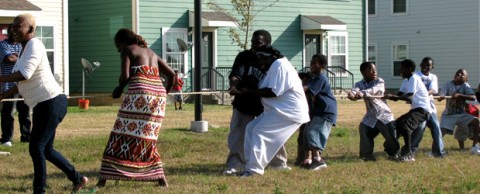Lifeline to kids: A shift to group mentoring

It was after dark one evening last November when 40-year-old Lewis Haley arrived at a city park in New Orleans to mentor some teenage boys, each of whom has a parent in prison. A temperamental streetlamp flickering in a corner of the outfield revealed that 45 boys were waiting for him. Haley volunteers as a mentor to all of them.
This isn’t how mentoring is supposed to work, say the experts. It’s best for one adult to focus exclusively on one child. But Haley found the need for mentors to be so great and so urgent that he bent his program’s rules and created a football team in order to reach dozens of kids.
Read our latest issue or browse back issues.
“We asked them to bring $3 each for the season, and only three kids out of 45 were able to do it,” said Haley, who became involved in mentoring through his church, Ebenezer Baptist. “We’re like the lifeline for these children. We can’t let them go.”
The scene reflects how some faith-based groups are responding to a national challenge. According to the Pew Center on the States, 2.7 million U.S. children have a parent behind bars. Most face multiple challenges, ranging from extreme poverty to lack of a stable adult presence in their lives. Yet the country produces nowhere near 2.7 million volunteer mentors.
“A shortage of mentors is always the most difficult problem,” said Ann Adalist-Estrin, director of the National Resource Center on Children and Families of the Incarcerated in Jenkintown, Pennsylvania.
Boys with incarcerated parents are especially hard to match. According to Big Brothers Big Sisters of America, they constitute the vast majority on waiting lists, and only 30 percent of mentors for children of prisoners are men.
To reach the millions of children without mentors, people of faith are increasingly defying the experts. In Detroit and in Richmond, Virginia, the Progressive National Baptist Convention is piloting programs that assign a mentor to a group of kids who have incarcerated parents. Other Christian groups are taking similar steps in New Orleans, Houston and Pittsburgh.
Last year, the Assemblies of God ended its one-on-one mentoring program for children of prisoners. The denomination is overhauling a decades-old camping program model to include group mentoring for at-risk kids, such as those with incarcerated parents, offering skill-building projects such as photography and website design.
“They’re not only getting a mentor relationship, they’re also making very positive peer connections,” said Mark Entzminger, senior director of AOG children’s ministries.
A federal cut helps explain why these shifts are happening now. As of last September 30, Congress eliminated funding for Mentoring Children of Prisoners (MCP), a $49 million program that began in 2003 as a Bush administration faith-based initiative. Responsibility for recruiting and training mentors has fallen back into the laps of nonprofits and churches that are eager to do what works—and are now free to experiment.
It’s in the experimenting that a controversy has arisen. MCP required programs to use “best practices” such as one-on-one mentoring and one-year commitments because research links long-term one-on-one bonds with better grades and behavioral improvements. Group mentoring has no research evidence to support its effectiveness.
Jean Rhodes, director of the Center for Evidence-based Mentoring at the University of Massachusetts Boston, says, “I don’t know of any peer-reviewed study of group mentoring.
“We were trying to stick with what data would support. . . . Some of the stipulations that seemed rigid were just because we were trying to adhere to the research.”
But many faith groups say dealing with the crisis can’t wait. In the Desire Street neighborhood of New Orleans, where gunfights left three young men dead between November and February, hundreds of teenage boys have no reliable men in their lives, says Marcia Peterson, executive director of Desire Street Ministries, a former MCP grantee.
In Detroit, mentors are trying to help kids live to see adulthood.
“We talk about survival—street survival,” said DeeDee Coleman, cochair of the PNBC’s Commission on Social Justice and Prison Ministry. “Some of these kids live on the street. Once the mentor is gone, they’re hustling, they’re making money. . . . So mentors are trained to deal with some hard situations.”
According to some church leaders, one reason for the lack of male mentors is that the one-on-one style of mentoring has become too risky for them. In an age of misconduct scandals and accusations, they say, men don’t dare pick up a boy at his home and head off for an outing.
“With the climate of litigation today, and suggestions that there are inappropriate relationships going on with children—guys don’t want to deal with it,” said Owen Cardwell, senior pastor of New Canaan International Church in Richmond, where a pilot program brings together groups of children of inmates with mentors, both in person and online.
“With the cluster mentoring, they feel a sense of safety in numbers, rather than being isolated with just one kid,” Cardwell said.
Another reason for a shortage of mentors is burnout. In Houston’s toughest neighborhoods, Ambassadors for Christ, a Christian mentoring agency, matched 80 mentors with individual kids in 2010, but only 20 pairs were still together a year later. (Nationwide, 46 percent of MCP matches lasted a year or longer.)
“Mentors get burned out in these neighborhoods, where it’s considered a badge of honor to go to jail,” said AFC Executive Director Sherrie Young. “To have men do mentoring in a group setting is better than having the kids just sitting on a wait list and not being mentored at all—because they’re going to emulate somebody. It’s better to have it be someone who’s a positive influence.”
Volunteer mentors from AFC visit schools at appointed times and talk with groups of kids about making sound decisions and resolving conflicts peacefully. Sometimes mentors lead a band or chorus as well.
The group approach means that fewer siblings are left out. Under MCP, mentors would pick up one mentee for an outing and often tell disappointed siblings they couldn’t come along. Now mentors welcome siblings.
At Household of Faith, a megachurch in Harvey, Louisiana, fathers are encouraged to include children of the incarcerated when they take their own kids to a park, movie or other activity. The men prepare for the ministry in small groups, where they discuss how to be dependable fathers and husbands, then pass the message to groups of kids.
“We know what works,” said Michael Thompson, who heads up mens’ ministries at Household of Faith. Red words on his black T-shirt convey a vision: “Real Men Worship.”
“When it comes to actually teaching them and training them, we’d rather have six or seven kids learn from one person whom we want kids to imitate,” Thompson said. “We’re very careful to pick men who will teach them well.”
Though group mentoring has gained momentum, concerns about the effort haven’t disappeared. Jeff Dorn, former director of the Assemblies of God’s MCP-funded program in Springfield, Missouri, oversees mentoring for children of prisoners for the Christian Association for Youth Mentoring in Springfield, Massachusetts. He still encourages one-on-one mentoring—even if it means that fewer kids have mentors.
“You’re often looking at four or five children who live under the same roof with a single mom or a single grandmother,” Dorn said. “These kids are starving for individual attention. . . . I don’t think there’s any good substitute for that good, one-on-one time that can occur with a mentor when a young person is ready to ask a significant question, or make a significant choice in his or her life.”
Group mentors, however, argue that children still get one-on-one attention in a group. For example, as Haley is busy coaching his football team, he’s also helped five boys from his team get scholarships to Brother Martin High School, a selective Catholic school in New Orleans.
“To make sure a child gets to Brother Martin High School—that’s individualized attention,” said his pastor, Lois Dejean. “If he weren’t a mentor to them, he wouldn’t be working on these scholarships with them. He’s making sure they get what they need.”





